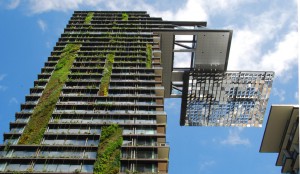If you’ve never been door knocked by a political party in the run-up to an election, it’s probably because your foot weary candidate can’t get past the secure lobby or lift to your flat or apartment to bail you up — and that may not be such a good thing for your community.
That’s the decidedly left field take from property development lobby group Urban Task Force which is now so concerned that voice of people living in secure apartment blocks and flats is going unheard in the looming New South Wales election it’s commissioned its own political research to get views from ‘behind the concierge.’
At first blush it the selective canvassing of 1000 Sydney residents on the issues that matter to them might sound like a gimmick poll from a vested interest group.
Even so, there are still plenty of eye-opening findings from a community which eschews suburban back yards and garages in favour of a more compact and convenient lifestyle well above ground level.
As congestion increases it seems the strata-set are much less worried about building big new big motorways and far more concerned about proximity to public transport and amenities (like shops that they can walk to) and, of course, affordability.
They’re a big voting block too, especially in Sydney.
In its push to get apartment dweller issues onto the political bargaining table, Urban Task force estimates that a whopping “56 per cent of Sydneysiders fit these apartment categories yet political parties seem to focus on house dwellers.”
Those numbers are based on a targeted survey commissioned from international pollster ResearchNow, which found that out of a sample of 1000 people, 630 were dwellers in apartments, 273 were investors and more than 100 are “intenders looking to move into apartments.”
Sydney is already more densely populated than other cities at least some of that concentration assisted by strong growth in larger multi-dwelling developments around inner metro areas and suburban hubs.
“Our concern is that political parties seem to read the community as suburban house dwellers rather than urban apartment dwellers. Candidates door knock houses but find access to apartments very difficult so their perception of the community is biased towards attitudes of suburban detached house dwellers,” Mr Johnson said.
“Those living in apartments…represent 35 per cent of Sydney households with half being renters and half owners,” Mr Johnson says.
“Another 15 per cent of Sydney siders are investors in apartments and another 6 per cent are intenders looking to move into apartments.”
Mr Johnson said that three factors were dominant as the key drivers for apartment living when people were polled: location, affordability and public transport.
“Location means convenience to grocery shopping, to work and to amenities. The message about location needs to go to urban planners so that walkable urban areas are planned where apartments are close to amenities,” the Urban Task Force report said.
“The proximity to public transport indicates an emerging number of apartment dwellers are preferring public transport to the use of a car. Only 62 per cent of renters own a car compared to the Sydney average of 82 per cent.”
The development lobby group is also out to change the perception of residents, planners and politicians that apartment blocks are not child friendly and largely for singles and childless couples.
Based on its survey, Urban Task Force estimates that 23 per cent of renters and 29 per cent of owners of apartments have children living with them.
“Governments need to more actively promote family friendly apartments where shared play areas and child care centres can provide an excellent environment for children. For many families it will be the mid-rise apartments of around 6 floors overlooking a common garden and play area that will be best for children,” the report said.
Comment below to have your say on this story.
If you have a news story or tip-off, get in touch at editorial@governmentnews.com.au.
Sign up to the Government News newsletter
Most read
Scathing report finds little has changed at PwC
Qld council welcomes progress on massive battery system
Inquiry to consider how federal govt can address councils’ sustainability issues
‘Local’ procurement turns out not to be so local, committee hears
Another report finds local government falling down on cyber security

